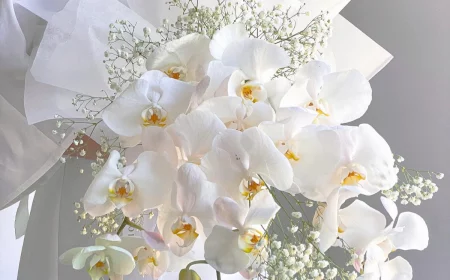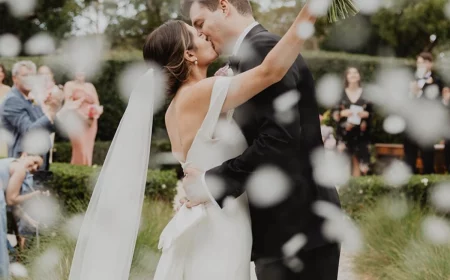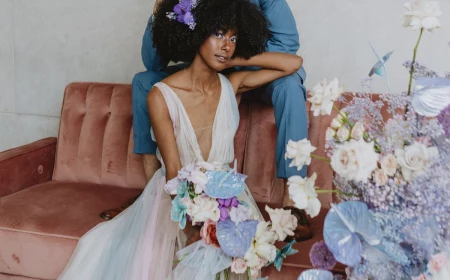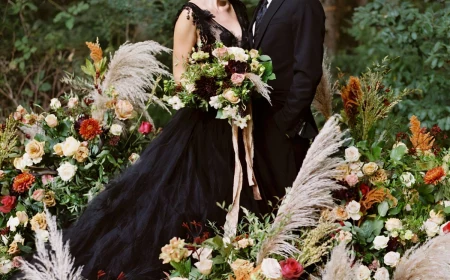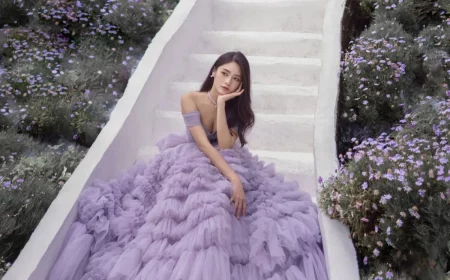Can You Actually Wear a Short Dress to a Wedding? A Stylist’s Real-Talk Guide
After years of styling people for just about every event you can imagine, one question pops up more than any other. It’s not about what’s trendy or the “it” color of the season. It’s about something much simpler: the hemline. Can you wear a short dress to a wedding?
The quick answer is yes, absolutely. But the real, professional answer is a bit more nuanced. It’s all about choosing the right short dress. It’s about looking at the fabric, understanding the invitation, and getting the context right so you look elegant and respectful, while still feeling like yourself.
Honestly, this isn’t about following a bunch of stuffy, old-fashioned rules. Think of your outfit as a way of showing the couple you get it—you value them and the huge step they’re taking. A great dress, short or long, says you’re there to celebrate. This guide is packed with the same practical advice I give my own clients to get it right every time.

First Things First: Fabric, Fit, and Finish
Before you even think about color or style, the actual material of a dress is what makes it feel special. The fabric and the way the dress is made are what separate a casual sundress from a celebration-worthy outfit. A huge mistake I see people make is falling for a dress online, only to have it arrive and feel flimsy or cheap—totally wrong for a wedding.
Why Fabric is Everything
The texture, weight, and how a fabric hangs are your secret weapons for making a shorter dress look formal and intentional.
- Go for Structure: Your best friends here are structured, formal fabrics. Think materials like brocade, jacquard, taffeta, or a nice, heavy crepe. They have enough weight to hold a shape, which instantly reads as more polished. A dress made from a silk-wool blend, for example, has a gorgeous subtle sheen and won’t turn into a wrinkled mess after you’ve been sitting for an hour. These fabrics skim the body instead of clinging, which adds a ton of sophistication. By the way, a true silk-wool dress can be a splurge (often $400+), but you can get a similar vibe on a budget. Look for a high-quality polyester crepe, which mimics the weight and drape for a fraction of the price, usually in the $100-$200 range.
- Be Careful with Flowy Fabrics: Things like silk, chiffon, or georgette can be stunning, but you have to be picky. A good quality chiffon dress should be lined, maybe even with multiple layers, so it’s not see-through. This is CRITICAL for daytime or outdoor weddings. I once had a client who found the perfect single-layer chiffon dress for a garden wedding. In the store, it looked fine, but in the sunlight? Yikes. We had to rush it to a tailor to add a proper silk lining. Quick tip: Before you buy, hold the fabric up to a window or a bright light to check for sheerness.
- Fabrics to Skip: For most weddings, you’ll want to steer clear of jersey, linen, and basic cotton. They just read too casual. The only exception might be a very relaxed beach wedding. Even then, linen is tricky—it wrinkles the second you look at it. If you must, go for a linen-blend in a dark color or a busy pattern, which helps hide the inevitable creases.
Cut and Construction Matter More Than You Think

The difference between a party dress and a wedding guest dress is often in the details of how it’s made.
- Lining is a Must: A well-made dress is almost always lined. A lining helps the dress hang beautifully, stops it from clinging to you, and just gives it a more substantial, expensive feel. For a wedding, I consider this non-negotiable. If you find the perfect unlined dress, a good tailor can add a simple lining for about $40 to $80. It’s an investment that can make a $150 dress look like a $400 one.
- Check the Seams: Look for smooth, straight seams and proper darting around the bust and waist. This is what gives a dress its shape and makes a simple sheath look elegant instead of like a potato sack.
- What
Galerie d’inspiration


Just how short is “too short”?
While the classic “fingertip rule” (standing straight, the hem shouldn’t be above your fingertips) is a decent starting point, the real answer is about movement and confidence. An A-line dress from a brand like Kate Spade offers more practical coverage than a fitted bodycon style of the same length. The ultimate test: can you sit, stand, and hit the dance floor without constantly tugging your hem down? If you’re self-conscious, it’s not the right dress for a long day of celebration.

More than 60% of weddings have a “Cocktail Attire” dress code, making it the most common in the U.S.
This is fantastic news for lovers of the short dress! This dress code is precisely the sweet spot for an elegant, shorter hemline. It signals an event that is festive and formal, but not black-tie stuffy. It’s your green light to choose a beautifully crafted dress in silk, crepe, or lace that falls at or above the knee.

The invisible foundation: The most stunning dress can be undermined by the wrong underpinnings. With shorter, often form-fitting styles, what’s underneath is non-negotiable. Seamless shapewear from a brand like Spanx or Commando isn’t about changing your shape, but about creating a perfectly smooth canvas so the dress fabric glides and drapes exactly as it should, without any distracting lines.

A shorter hemline puts your shoes on full display, making them a key part of your outfit. They set the tone for the entire look.
- To Elevate: A metallic strappy sandal, a pointed-toe pump, or a sophisticated block heel. Brands like Loeffler Randall or Schutz are masters of the statement-making-yet-comfortable wedding shoe.
- To Avoid: Casual wedges, everyday flats, or heavy platforms which can visually weigh down the refined look of a formal dress.

Evening Glamour: A dress in slinky satin or with subtle sequin embellishments. Think a slip dress from a brand like Vince, perfect for a city wedding with dancing under dim lights.
Daytime Chic: A dress made of structured crepe or a floral jacquard. This style, often perfected by brands like Shoshanna, is ideal for garden parties or afternoon ceremonies where the structure of the fabric provides a more polished, formal feel in the daylight.
The right texture ensures your dress feels appropriate for the time of day.
- It adds a layer of sophistication and visual interest.
- It provides extra coverage for a church ceremony or a breezy evening.
- It balances the shorter hemline for an effortlessly chic look.
The secret? A perfectly paired wrap or jacket. Consider a feather-light cashmere pashmina in a complementary color, a tailored blazer draped over your shoulders for a modern edge, or even a silk bolero for a more traditional touch.

